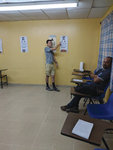By JEN COWART In February, Cranston High School West junior Nikolas Montaquila spent several days on a mission trip to Panama as part of the Northeast chapter of Volunteer Optometric Services for Humanity, or NEVOSH. The trip was sponsored by the Rotary
This item is available in full to subscribers.
We have recently launched a new and improved website. To continue reading, you will need to either log into your subscriber account, or purchase a new subscription.
If you are a current print subscriber, you can set up a free website account by clicking here.
Otherwise, click here to view your options for subscribing.
Please log in to continue |
|


In February, Cranston High School West junior Nikolas Montaquila spent several days on a mission trip to Panama as part of the Northeast chapter of Volunteer Optometric Services for Humanity, or NEVOSH.
The trip was sponsored by the Rotary Club, and this year’s destination in Panama was the city of Penonome.
“My dad is an eye doctor and I have two cousins and my dad who went on this trip,” he said. “We set up a clinic in a college with seven different disciplines of medicine, even though the trip was eye-centric. We had disciplines that included general medicine, dermatology, and ear, nose and throat. They cleared out half of one building for us and we had two general medicine rooms, a pharmacy, three optometry rooms, a dental wing and a mobile surgical area for minor procedures like dermatology.”
Montaquila is no stranger to working in optometry. He has worked as an optometric technician under his father since the age of 8, making and inspecting glasses and learning the inner workings of prescriptions. He has also been a camp counselor at the Lions Club Camp Macheauta, working with children 18 and under who have vision problems. Additionally, he has spent a great deal of time shadowing renowned eye doctor Paul Koch in both the office and in surgery.
Therefore, one would think that he had seen it all. However, Montaquila quickly learned that the problems he had seen here in the United States paled in comparison to the vision issues people were living with day-to-day in Panama.
“We were working primarily with donated glasses,” he said. “We had two opticians, a head optician and one other. We had me, the wives of two of the doctors, and eight medical students from [the State University of New York] who rotated through. In four days, we saw 5,000 patients, and 2,300 were for eyes alone. We were seeing 675 patients a day, which is 600 times faster than what I do with my dad.”
As the SUNY students logged all of the donated lenses into a computer database, patients were being screened and a computer would generate the closest prescription to match a patient’s needs.
“With my experience as a technician, I could help to adjust the tolerances of the glasses to get the closest script that was best for them,” he said. “It was amazing to see just how grateful they were to have anything at all. The contrast to the care here, versus the care there, was stunning. To see the very real problems that they have versus the problems we have and just how much help they needed was amazing. For many of the patients we encountered, we were their only access to medical care of quality for an entire year. Some of our patients we, unfortunately, did not possess the capability to fully treat and face uncertain fates, yet for the mass percentage of patients we saw, we were able to make a tangible, at times extreme, difference in their lives.”
As someone planning to pursue a future career in global health and medicine, the mission trip had an impact on Montaquila’s perspective.
“This trip was so much more than I ever expected it would be. My cousin had said that we would be amazed by the people we saw and the help that we could give them. I had first looked out of the plane, down at Panama City, and I thought, ‘How bad could it really be?’” he said. “After a three-hour bus ride southeast of Panama City, we found out. People were walking hours to get to the clinic. There were buses and taxis and cars with many people in them. They trusted us more than they trusted their own doctors. So many of the conditions we saw there, conditions people were blind from, were treatable conditions here.”
If Montaquila had doubts about his ability to help make a difference before he left for the trip, he was reassured of the impact he had by the time the trip concluded.
“If I could help all of these people with just the knowledge I had, so much can be done with such simple training,” he said. “There are so many people who need help and so many people who think they can’t help, that they’re not skilled enough, but they can make a difference. This put things in perspective for me. This was not for self-gain, this was not about me.”
Comments
No comments on this item Please log in to comment by clicking here